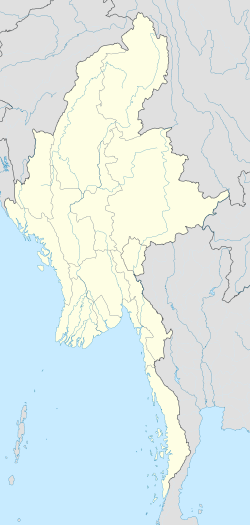Alanpya Pagoda (Burmese: အလံပြစေတီ; also known as Signal Pagoda) is a Burmese pagoda located on Alanpya Hill, on the southern part of Dhammarakhita Hill, in Yangon, Myanmar.[1] The pagoda is south of Maha Wizaya Pagoda.
| Alanpya Pagoda | |
|---|---|
အလံပြစေတီ | |
 Alanpya Pagoda in 1855 With the time ball attached by the British | |
| Religion | |
| Affiliation | Buddhism |
| Sect | Theravada Buddhism |
| Region | Yangon Region |
| Location | |
| Municipality | Yangon |
| Country | Myanmar |
| Geographic coordinates | 16°47′25″N 96°09′17″E / 16.790324°N 96.154699°E |
| Specifications | |
| Height (max) | nyandaw height: 29.97 m (98.3 ft) |
| Spire height | with hti inclusive: 33.91 m (111.3 ft) |
Names
editAlanpya Pagoda is known by a number of various names. During British rule in Burma, the pagoda acquired its present-day name, Signal Pagoda (Alanpya Zedi in Burmese), because it was used as a signal station for vessels coming up Yangon River.[2] It was also known as McCreagh's Pagoda, after Brigadier McCreagh, and as Sale's Pagoda, after Lieutenant Robert Sale, who was stationed there during the First Anglo-Burmese War.[2] The pagoda has also been known as Sandawkyo Pagoda (ဆံတော်ကြိုစေတီ), Gurkha Pagoda, and Tattoo Pagoda (တပ်ဦးစေတီ), as well as by its Mon language name, Kyaik Hapaw Cih (ကျာ်ထပှ်ထစှေ်, /caik həpɔh cih/).[1]
History
editAccording to the Shwedagon Chronicle, the pagoda pre-dates Shwedagon Pagoda, and was built on the site of a pavilion honoring the arrival of the Buddha's hair relics.[1] The pagoda was toppled in 1348 and subsequently renovated by King Razadarit.[1] In 1452, Queen Shin Sawbu gilded the entire pagoda, which was reconstructed by King Bayinnaung in 1564.[1] The pagoda was rebuilt yet again in 1775 by Min Letwe, King Hsinbyushin's minister.[1] The pagoda's site subsequently became a military encampment for British forces following the First Anglo-Burmese War.[1] The pagoda's present hti (umbrella) was donated in November 1910.[1]
References
edit- ^ a b c d e f g h Thidar, Khin. "Historical Perspective of Signal Pagoda" (PDF). Journal of the Myanmar Academy of Arts and Science. XI (9): 161–172. Archived from the original (PDF) on 2016-11-28. Retrieved 2016-11-28.
- ^ a b Wright, Colin (26 March 2009). "No. 102. Rangoon. Signal Pagoda". British Library. Retrieved 2016-11-28.
